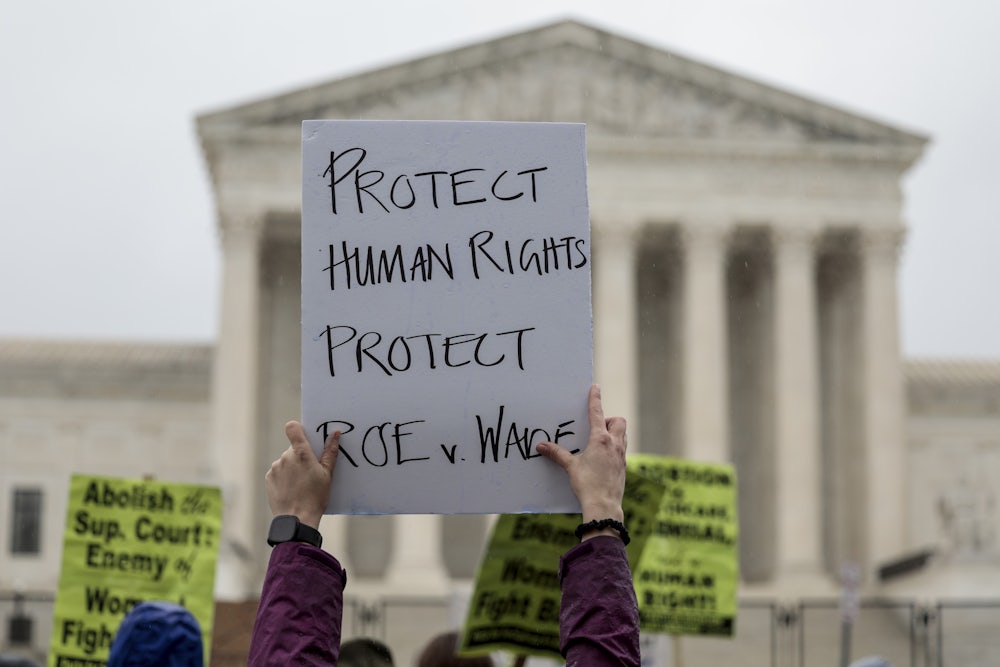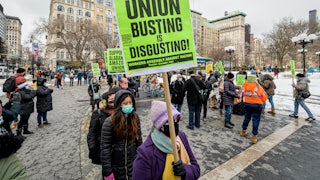Hope is important, now more than ever. I don’t suggest that we can or should be blindly optimistic. Far from it. Our very democracy and our ability to solve the problems all our people face is in grave danger. But defeat is not inevitable. We need the hope that the philosopher Soren Kierkegaard defined as “a passion for what is possible.” Never has it been more important to recognize and aggressively believe in the possibility we have as a people to save our democracy, if we are willing.
To many, this will sound out of touch with the news cycle and disconnected from our current reality. Sixty-four million women and girls of childbearing age just watched the Senate fail to pass legislation, the Women’s Health Protection Act, to protect their ability to control their bodies and reproductive choices. For too many low-income people, particularly Black and Native American and Native Alaskan women, who are far more likely to die of pregnancy-related complications, this sends the clear message that their lives are not of sufficient concern. For the LGBTQ community, who deserve the right to identify as they are and receive the health care they need, this is also a major blow. Roughly half of us who need protection of our fundamental right to make decisions about our bodies live in states that will try to take that away from us.
And yes, it gets worse. The possible consequences of Justice Samuel Alito’s draft opinion that would wreak havoc on all of our fundamental rights are clear. If a fundamental right has to be named and protected explicitly in the Constitution, as the draft opinion says, then why would we believe marriage equality, contraception access, and racial justice won’t be next?
This is an ideological court driven by the very political gerrymandering that has also undermined our ability to protect people against the suppression of their votes, from harsh identification laws, closing of polling sites, and elimination of early voting in some states. Violence in the context of democratic practices and debate was not only on display at the Capitol on January 6, 2021. It has been on display in school board meetings and at statehouses. This in turn has all made all predictions about the midterm elections dire.
However, three things are true that should make us passionate enough to fight hard and collectively against all these forces. First, those of us who care about making this country a better place to live; who agree on key issues from abortion rights to increased minimum wages and tax increases on the wealthy and more, including democracy and our constitutional rights, are the clear majority of this country. That is a huge opportunity to build will and engagement around winning policies to protect our rights and improve all of our lives, including for those of low income and communities of color.
Second, we have built up significant relationships and work in the hardest of contexts that helped us withstand some key attacks on democracy and push back. Most recently, we worked to confirm Justice Ketanji Brown Jackson, the first public defender and Black woman to be elevated to a seat on the Supreme Court. That victory came despite a concerted effort from the right of the country and from most Republicans to distort her record and lie about her humanity. But there is another pro-democracy victory we should celebrate and build upon. In the 2020 census, the Trump administration did everything in its power to undermine an accurate count of our people, a task explicitly required by the Constitution and critical to electoral power and ensuring federal funding dollars for communities. Despite the attempt to drive immigrants away from the count and to underfund it, through the efforts of community members, elected officials, and all kinds of civic-minded groups, we held the line and even, in places like New York City, improved on previous counts. That was a win in the face of real adversity, but it also built a set of relationships and strategies that can serve us now and into the future to build community education and engagement to save our democracy.
Third, by recognizing we have some wins and that we have been building the capacity to win in tough times, we can now focus on the midterms and beyond in a passionately possible way. I know it is a steep climb. In every midterm election since 1934, the sitting president’s party lost seats in the House and Senate. Only Franklin Delano Roosevelt’s 1934 Democrats and George W. Bush’s 2002 Republicans gained seats. In each case, a major catastrophe—the Great Depression for FDR and the 9/11 terror attacks for Bush—probably explained the anomalous outcome.
There are some objective reasons to lean into hope. This may not be a Great Depression or post-9/11 moment, but we are not in normal times by any stretch. As Mathew Dowd points out, Biden’s negative approval rating is incongruously countered by the Democrats’ plus-five-point advantage over Republicans in a generic poll. The economy is a huge challenge, because food and gas prices make it a difficult environment in which to hold the House and Senate. But there is also a great desire from people to fix these problems, and we must point, much more aggressively than we do, to how much our participation and fighting for things like health care and stimulus benefits have helped families in every community. The problem isn’t that we haven’t had real and meaningful victories. It is that we aren’t telling people their stories.
Here is an example. We need Black voters and young people to turn out to vote. Even with the strong and bipartisan support among voters for abortion access, the right’s attack on Roe v. Wade does not, alone, solve the enthusiasm gap for these key voters. Enthusiasm is low because many are understandably disappointed that we didn’t see legislative victories we fought for, such as the George Floyd Justice in Policing Act. People want to be safe from violent crime, and they also want to be safe from police violence. But telling the story of how far we got, that we passed it in the House, gives us a better way to encourage voting in the midterm elections. We motivate based on success, not by complaining about failures. We take for granted that most voters are paying attention as closely as we are. That is a huge mistake, but it is also easily corrected. Talking about what we have been able to achieve because we participate in elections and what we can do with the power we build by participating should give us hope. If we allow the major narrative to be complaints about all we’ve lost, we’re only telling people to give up. Let’s be passionate about our possibilities. Let’s fight hopefully.






